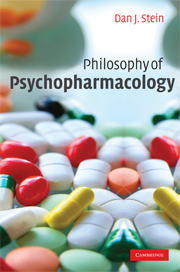Book contents
- Frontmatter
- Contents
- Preface
- 1 Psychopharmacology – a remarkable development
- 2 Philosophical questions raised by psychopharmacology
- 3 How to think about science, language, and medicine: classical, critical, and integrated perspectives
- 4 Conceptual questions about psychotropics
- 5 Explanatory questions about psychotropics
- 6 Moral questions about psychotropics
- 7 Conclusion
- References
- Index
7 - Conclusion
Published online by Cambridge University Press: 13 August 2009
- Frontmatter
- Contents
- Preface
- 1 Psychopharmacology – a remarkable development
- 2 Philosophical questions raised by psychopharmacology
- 3 How to think about science, language, and medicine: classical, critical, and integrated perspectives
- 4 Conceptual questions about psychotropics
- 5 Explanatory questions about psychotropics
- 6 Moral questions about psychotropics
- 7 Conclusion
- References
- Index
Summary
The possibility of a naturalistic approach to the philosophy of psychopharmacology
Throughout this volume, we have begun by contrasting a classical approach (often referencing the viewpoint of one or other philosopher within the linguistic–analytic tradition) with various critiques of such an approach (often referencing the viewpoint of one or other continental philosopher). Then, rather than attempting to resolve this debate on its own philosophical terms, we have asked whether an integrative approach that uses some constructs drawn from each, and that is consistent with a realist philosophy, can be supported by data from contemporary cognitive-affective science. It has been suggested that such data generally reinforce a view that the mind-brain is embodied; sensorimotor and affective neuronal circuitry allows humans to interact with their physical and social world, and this in turn leads to the development of basic-level and abstract cognitive-affective maps (or metaphors) for understanding the world. These data support particular ways of approaching conceptual, explanatory and ethical questions in general, and issues in psychopharmacology in particular.
Is this the right way to do philosophy? It is certainly not one that would be widely accepted. Nevertheless, in my immediate defence, I would say that there is an important tradition in which philosophy is intended to be panoramic in scope, considering and integrating theories across disciplines and sciences. In ancient Greece, philosophy, or the “love of wisdom” covered a broad spectrum of questions.
- Type
- Chapter
- Information
- Philosophy of Psychopharmacology , pp. 131 - 140Publisher: Cambridge University PressPrint publication year: 2008



